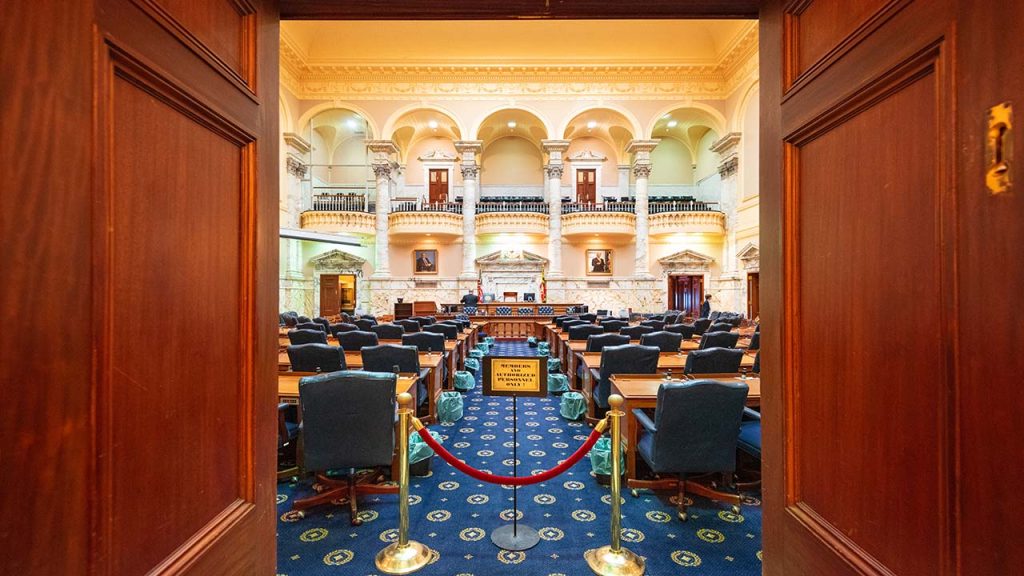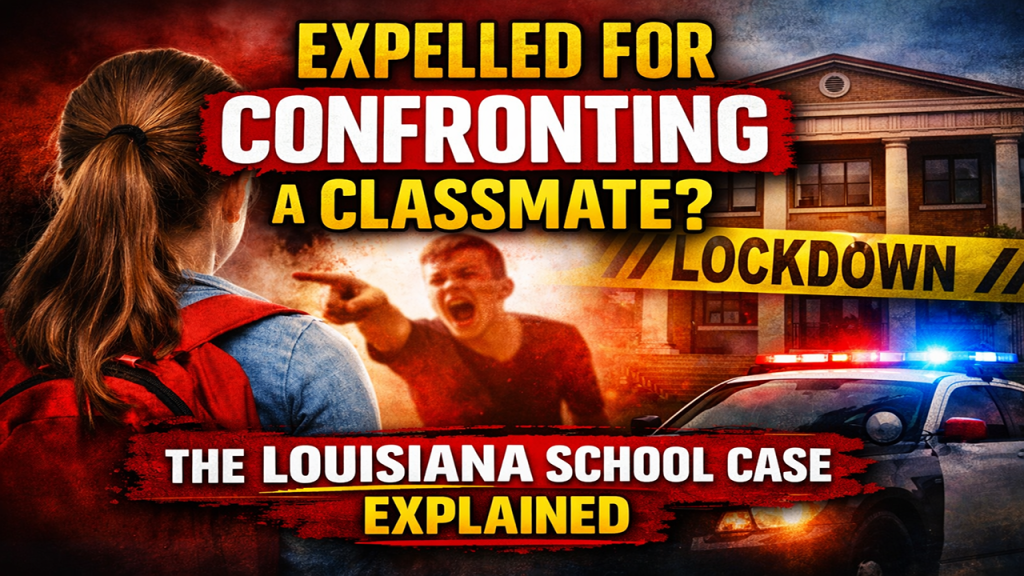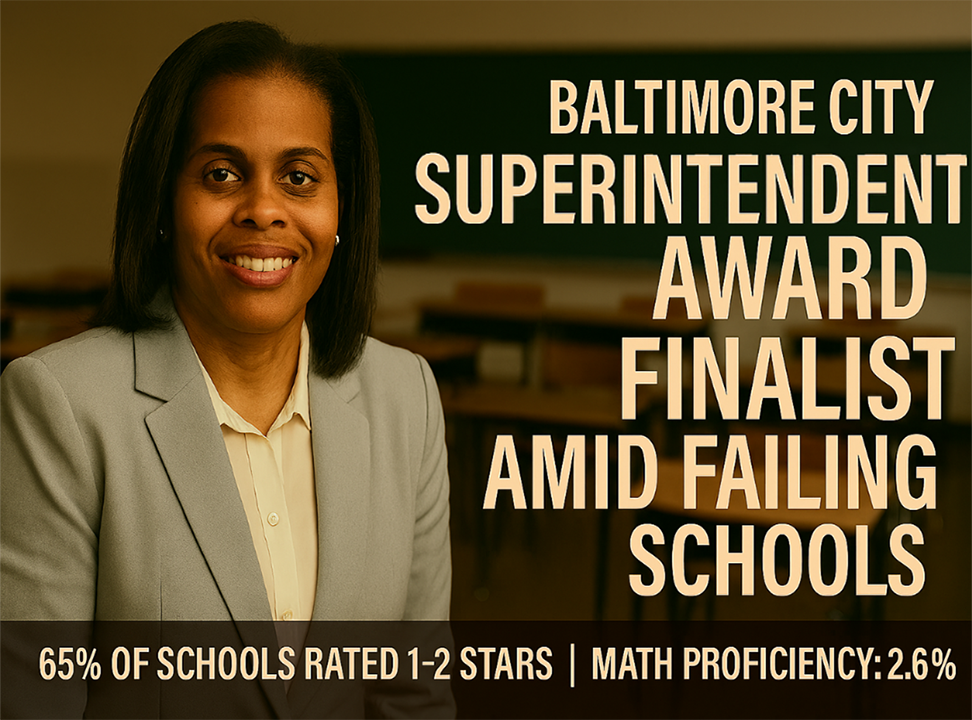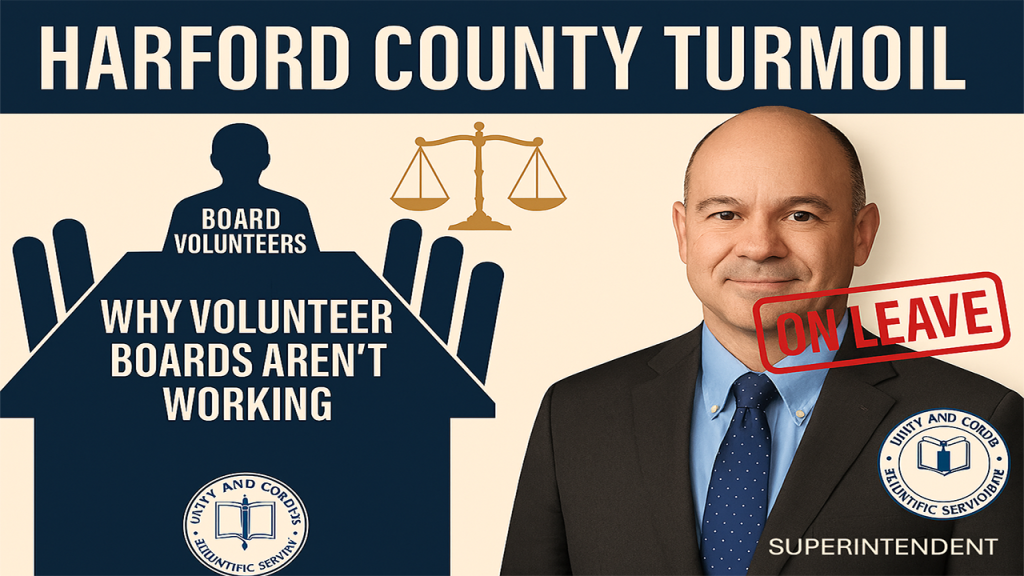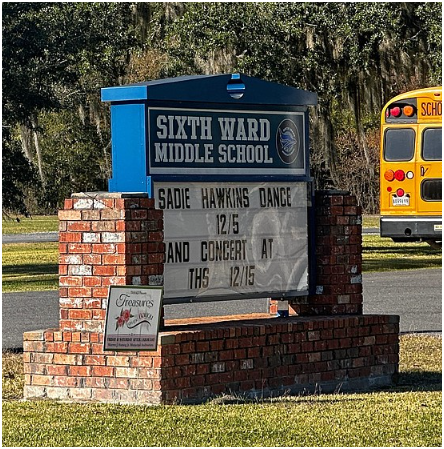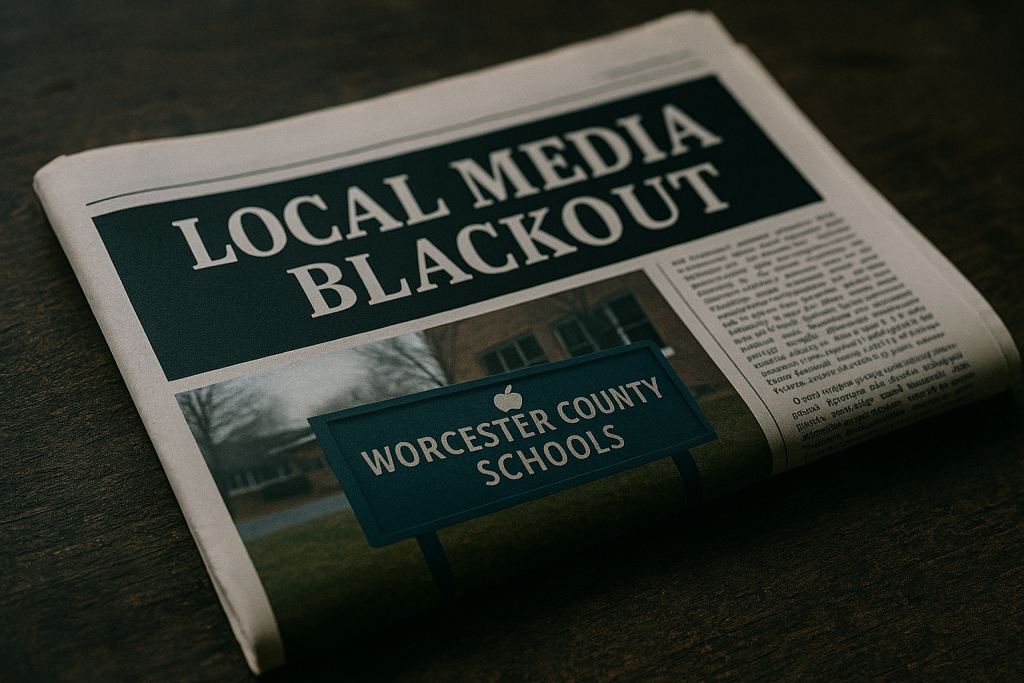

Hot Mic, Hard Choices: Politics Shake Somerset County Classrooms
Somerset County is not your average Maryland school district. It is a place where politics runs more sharply than in the state’s urban and suburban corridors. Somerset has become ground zero for the intensifying clash between conservative counties and liberal governing state bodies. The recent standoff between its Board of Education and its superintendent is neither isolated nor accidental but rather illustrates strains in rural districts navigating culture wars, funding pressures, and community demands.
The Political Foundation: Registration, Voting Patterns of Somerset County
Before evaluating the school conflict, we should provide context regarding Somerset County and its politics.
- In the April 2024 “Eligible Active Voters on the Precinct Register (Presidential Primary)” report, Somerset County is recorded as 5,410 Democrats and 6,137 Republicans, for a total of 11,547 active registered voters. Republicans hold an edge of 6.3 percentage points.
- In the 2024 Presidential General Election, the official Maryland Board of Elections results show that Donald J. Trump received 57.27% of the vote in Somerset County and Kamala D. Harris received 39.99%, giving Trump a lead of 17.28 points in that county. Meanwhile, statewide results from the same BOE source show Harris with 62.62% and Trump with 34.08%, a Democratic margin of 28.54 points.
- Thus, Somerset County’s electorate has shifted markedly to the right relative to Maryland as a whole. The county’s Republican advantage in the 2024 presidential vote (17.3 points) significantly differs from the statewide Democratic margin (28.5 points). In effect, Somerset lies 45.8 percentage points to the right of the state’s overall partisan outcome, making it one of Maryland’s most reliably Republican-leaning counties in recent years.
These metrics matter. They establish a baseline of political legitimacy for a board majority inclined to make aggressive policy shifts. A board that believes it is aligned with the local electorate’s political makeup will feel a mandate to make changes, even in the face of professional or legal resistance.
At the same time, that margin is not insurmountable; the Republican lead in registration could still allow electoral tides (turnout, candidate quality, etc.) to shift dynamics. In short, the board’s ideological ambitions rest on a fragile base because of the much closer registration numbers.
The Board vs. Superintendent Showdown timeline
Here is how the conflict has unfolded, with key episodes and their significance:
Appointment & Early Tension
- In June 2024, the Somerset Board of Education hired Dr. Ava Tasker-Mitchell to a four-year term, effective July 1, 2024.
- From the start, board members (notably Board Chair Matthew Lankford) expressed skepticism about policies tied to DEI (Diversity, Equity, and Inclusion), library autonomy, and curriculum control.
“Hot Mic” & Community Backlash
- In late 2024, a microphone left live at the conclusion of a board meeting captured Tasker-Mitchell commenting that Deal Island Elementary “should’ve been done away with years ago.” WBOC TV+247abc+2
- That remark triggered sharp pushback from the Deal Island community and broader district. Parents, students, and local leaders felt blindsided by what they viewed as a devaluation of their school. Tasker-Mitchell later apologized, insisting she had no active plans to close the school, framing her comment as contextual to historical debates rather than immediate action.
- But the damage was done, trust was fractured, and the board’s assertion that no decision to close had been made was met with skepticism.
Budget Skirmishes & Power Tussles
- Over 2025, the board and superintendent locked horns over critical staffing and budget priorities.
- The board proposed eliminating five vice principal positions; Tasker-Mitchell argued they were essential to day-to-day school operations.
- The board also aimed to cut $1 million in funding for media specialists/librarians, asserting that fiscal discipline required austerity. Tasker-Mitchell and community stakeholders pushed back, arguing such cuts undermine literacy, library access, and instructional support.
- County Commissioners stepped in, approving $1 million above the state’s maintenance-of-effort requirement, enabling some media specialists to be retained despite the board’s cuts.
- The board sought to appoint a deputy superintendent, asserting that this role would help bridge discipline and administrative control, an initiative Tasker-Mitchell initially resisted on fiscal grounds, though she later accepted it given the additional funding.
Removal Attempt, State Intervention & Reinstatement
- In mid-2025, the board abruptly terminated Tasker-Mitchell, placing her on administrative leave. They sought to install former Dorchester superintendent David Bromwell as interim.
- The Maryland State Superintendent, Carey Wright, intervened swiftly. She issued a 60-day stay on the board’s action, reinstating Tasker-Mitchell temporarily and warning that continued violation of state law could lead to withholding of state funds or removal of BOE members.
- The state used emergency regulatory authority to extend the stay beyond 60 days, pending hearings or appeals. Wright explicitly denied the board’s request to force Tasker-Mitchell to vacate district property.
- On June 6, 2025, Tasker-Mitchell was reinstated after the stay and public pressure.
The Fallout
The Office of the Inspector General for Education (OIGE) issued two reports raising concerns about the legality of board actions: One flagged failure to approve a new English Language Arts curriculum, threatening a $10 million literacy grant if the district remained out of compliance. Another flagged a revamped library media selection policy that severely restricted librarians’ discretion, arguing it could violate state and First Amendment protections. Also, State Superintendent Wright issued explicit warnings: the board must follow state law or risk funding cuts and removal of board members for “willful neglect.”
In Somerset, the school board’s recent actions suggest a shift toward greater oversight and direct involvement in curriculum and policy decisions. Efforts to centralize authority over instructional materials, adjust diversity and inclusion initiatives, and review library selections reflect an attempt to align local education priorities with community values. These are the same values evident in the previously mentioned voting patterns. However, these moves have also raised concerns among educators and residents who fear that decisions are being made without sufficient transparency or input.
To further their concerns, amid escalating tension and confrontations during in-person meetings, the Somerset County Board of Education recently announced that it will hold meetings exclusively online, citing growing security concerns and disruptions. One board official claimed the shift was necessary because of “increased violence, vitriol and disruption” at past gatherings. Critics have raised alarms that the move may reduce opportunities for direct public engagement, especially in a rural community where many residents prefer or rely on in-person participation. The Maryland Office of the Inspector General for Education also noted that the change must still comply with the Open Meetings Act, which requires that the public be able to observe remote sessions as they occur, though it does not always guarantee interactive access.
The board’s assertiveness is tempered by legal, fiscal, and institutional constraints, including Maryland law which requires boards to follow established procedures for terminating superintendents (just cause, hearings, appeals). The board’s attempt to circumvent that triggered the state intervention. Also, the OIG reports and the threat of withheld grants clearly demonstrate how ambitious policy interventions (such as refusing a curriculum or altering library policy) can create problems with essential funding, which the board cannot ignore.
The board’s recent decisions have prompted strong reactions from many parents, teachers, and community members who value education and prioritize collaboration, inclusion, and stability in local schools. While the response isn’t strictly partisan, it reflects a broader defense of the professional practices that have long guided public education in the state. This pushback, supported by educators and some local officials, underscores how quickly public trust can erode when major policy changes move forward without open communication or shared decision-making. For Somerset’s schools to move forward, rebuilding confidence through dialogue and transparency will be essential.
The “hot mic” controversy, centering on Deal Island Elementary, magnifies the central danger: when a superintendent (or board) makes statements suggesting disregard for a community institution, especially one embedded in a tight-knit, rural area, trust erodes rapidly. The perception that decisions are top-down, ideological, and dismissive of local identity fuels mobilization. Deal Island has had public schools for about a century, so it is not surprising that a comment like this touched off such emotions. Communities such as this will never forget it.
Somerset is a district with a majority Black student population. The fact that Tasker-Mitchell is Black and that the board’s criticisms focus heavily on DEI, library content, and ideological “neutrality” complicates the dynamics. Local activists and civil rights groups have framed the board’s agenda not just as administrative control, but as part of a broader push to curb educational equity.
Additionally, the board has severed ties with longtime legal counsel and replaced them with politically connected attorneys (e.g., Gordana Schifanelli, previously aligned with conservative politics in Maryland and appears to have little or no experience in education law), a move that many perceive as consolidating political control over legal strategy rather than seeking neutral counsel.
Because Somerset leans Republican by registration and in voting, board members likely feel empowered to act strongly, believing they reflect the base’s preferences. But the margin is not huge, and aggressive policy moves increase the risk of alienating moderate Republicans, independents, and public-sector professionals (teachers, librarians) who may not align with hardline education reforms.
If this conflict escalates, board members risk electoral blowback — either through public discontent or formal consequences (board removal, state sanctions). Indeed, state actors have already signaled that willful neglect or law-breaking could trigger official action against board members.
Somerset’s school conflict is more than a local board fight; it reveals deep tensions at the intersection of community values, government authority, and education. In a county with a strong Republican tilt, the board’s assertive agenda around curriculum, staffing, and library control may reflect local political alignment, but it also exposes real risks to institutional stability, funding, and community trust. The shift to virtual meetings further signals a board prioritizing control over transparency. This creates concerns around accountability and voice in public education. For Somerset’s students and communities to move forward, all sides must recommit to transparency, respectful dialogue, and collaboration, not unilateral power plays. While a conservative or right-leaning agenda may be in the driver’s seat in Somerset, it is in the back seat at the state level. And, as we all know, it is the state that holds all the cards when it comes to education. Local school boards, contrary to the belief of many, have little control over such matters.
Dig Deeper With Our Longreads
Newsletter Sign up to get our best longform features, investigations, and thought-provoking essays, in your inbox every Sunday.
The MEN was founded by John Huber in the fall of 2020. It was founded to provide a platform for expert opinion and commentary on current issues that directly or indirectly affect education. All opinions are valued and accepted providing they are expressed in a professional manner. The Maryland Education Network consists of Blogs, Videos, and other interaction among the K-12 community.




